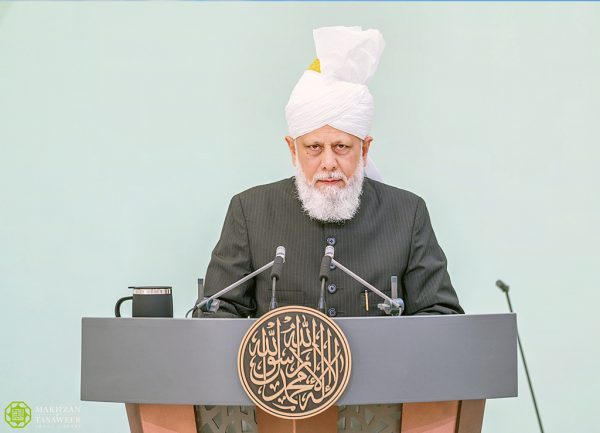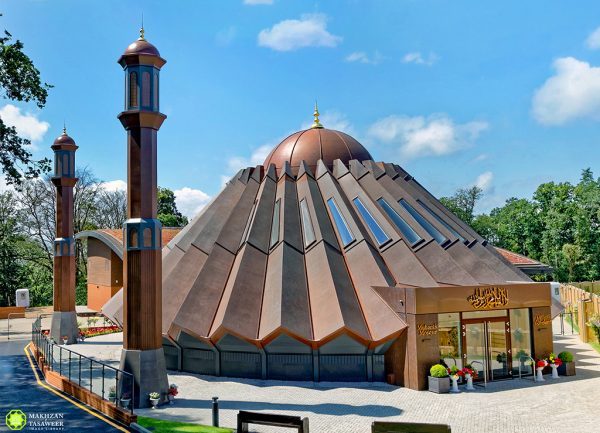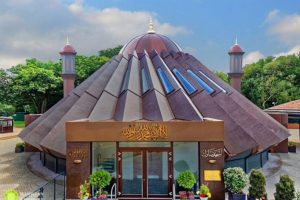After reciting Tashahhud, Ta‘awwuz and Surah al-Fatihah, His Holiness, Hazrat Mirza Masroor Ahmad (aba) said that in the previous sermon, he had been mentioning the way in which the Muslims entered Makkah at the time of the Conquest of Makkah, and he would present further details in this regard.

His Holiness (aba) said that when the Muslims reached a place called Dhi Tuwa, they waited for the Holy Prophet (sa) to arrive. The Holy Prophet (sa) was riding his camel named Qaswa, and it is recorded that the Holy Prophet (sa) was reciting Surah al-Fath (The Chapter of Victory) from the Holy Qur’an. It is also recorded that as the Holy Prophet (sa) entered Makkah, people came to see him and they saw the Holy Prophet’s (sa) head bent so low in humility that it was touching the saddle he was seated on. The Holy Prophet (sa) was donning a black turban, and his flag and flagpole were also black.
His Holiness (aba) said that at Dhi Tuwa, the Holy Prophet (sa) declared that the true life is that of the hereafter. Behind him on his camel, the Holy Prophet (sa) was accompanied by Usamah (ra), the son of the freed slave Zaid bin Harithah (ra).
His Holiness (aba) said that the Holy Prophet (sa) entered Makkah on the 20th of Ramadan. When the Holy Prophet (sa) was asked where he would stay while in Makkah, the Holy Prophet (sa) said he would reside in Khaif Banu Kinanah, where the Makkans had once sworn their disbelief. This reminded Hazrat Jabir (ra) of a similar statement that the Holy Prophet (sa) made when he was in Makkah, when he said that whenever he went back to Makkah, he would stay at Khaif Banu Kinanah, because that was where the disbelievers had sworn that they would not do business with the Banu Hashim, they would not marry them and they would not protect them, and then confined them to the valley of Shi’b Abi Talib. According to some scholars, the decision of the Holy Prophet (sa) to reside there was as a form of gratitude to Allah.
A Blessed Monday
His Holiness (aba) quoted Hazrat Mirza Bashiruddin Mahmud Ahmad (ra), the Second Caliph who said that the day the Holy Prophet (sa) entered happened to be a Monday, the same day that the Holy Prophet (sa) departed from the Cave of Thaur to migrate towards Madinah, but before doing so he looked back at Makkah and said that no place was dearer to him than Makkah, but its dwellers did not allow him to remain there.
His Holiness (aba) said that when the Holy Prophet (sa) arrived, Hazrat Umm Hani (ra) said that she went to meet with him. She saw the Holy Prophet (sa) offering eight units of voluntary prayers. Thereafter, the Holy Prophet (sa) turned to her and asked why she had come. She explained that two of her relatives from the Banu Makhzum entered her home; however, Hazrat Ali (ra) said that they would still be killed. The Holy Prophet (sa) replied that anyone who entered her home would remain protected, and Hazrat Ali (ra) would not do any such thing.
Purifying the Ka’bah of the Idols
His Holiness (aba) said that the Holy Prophet (sa) then donned his armour, mounted his camel and went towards the Sacred Mosque. There were 360 idols surrounding the Holy Ka’bah. The Holy Prophet (sa) had a staff in his hand, and as he passed by the idols, he used his staff to strike each of the idols as he said, ‘truth has come and falsehood has vanished away. Falsehood does indeed vanish away quickly.’ (The Holy Qur’an, 17:82). Then the Holy Prophet (sa) drew near the Ka’bah and touched the Black Stone and proclaimed ‘Allah is the Greatest’, and the companions followed in the same proclamation. Then, the Holy Prophet (sa) circled around the Holy Ka’bah.
His Holiness (aba) said that the Holy Prophet (sa), while at Batha, instructed Hazrat Umar (ra) to go to the Ka’bah and erase any and all images that had been made inside it. It is recorded that the Holy Prophet (sa) did not enter until those images were erased.
His Holiness (aba) said that then, the Holy Prophet (sa) went by the Maqam-e-Ibrahim where he offered two units of voluntary prayer. Then the Holy Prophet (sa) drank water from Zamzam and used it to perform ablution. Thereafter, the Holy Prophet (sa) instructed that the largest idol, Hubal, be destroyed. Upon this, Hazrat Zubair bin al-Awwam (ra) reminded Abu Sufyan of the manner in which he had glorified Hubal on the day of the Battle of Uhud, yet here Hubal was destroyed. Abu Sufyan replied by saying, ‘O son of Awwan, leave such talk, for I have realised that if there was any god besides the God of Muhammad (sa), then what has happened here would never have happened.’
His Holiness (aba) said that the Holy Prophet (sa) asked for the key to the Ka’bah to be brought and then instructed for the Ka’bah to be opened. The Holy Prophet (sa) entered and offered voluntary prayers for an extended period of time as he stood between two pillars with three pillars behind him.
His Holiness (aba) quoted Hazrat Mirza Bashiruddin Mahmud Ahmad (ra) who said that the ten thousand Muslims who accompanied the Holy Prophet (sa) on that day have been described as angels. One of the defining qualities of angels is that they do only as they have been commanded. Such was the state of those Muslims, as all of one’s faculties are under the control of God. Just as the idols that day were destroyed, one only becomes purified when the idols within their heart are destroyed, as God says, ‘He indeed prospers who purifies it.’ (The Holy Qur’an, 91:10)
Holy Prophet (sa) Delivered Address in Ka’bah
His Holiness (aba) said that on this occasion, the Holy Prophet (sa) also delivered an address in which he said that the Muslims should always remain ready for the undertaking of jihad. The Holy Prophet (sa) reiterated the sanctity of the Sacred Mosque, where no fighting should take place, no animals should be killed and none of its vegetation should be cut down.
His Holiness (aba) said that in this address, as the Holy Prophet (sa) stood in the doorway of the Ka’bah, he proclaimed the Unity of God. The Holy Prophet (sa) said that the most pious among people were the most righteous. He asked the Quraish what they thought he would do to them? They said that whatever the Holy Prophet (sa) decided would be best. The Holy Prophet (sa) then announced general amnesty, saying in the words of Joseph (as), ‘No blame shall lie on you this day.’ (The Holy Qur’an, 12:93). This forgiveness of the very people who had tortured and exiled the Holy Prophet (sa) was a manifestation of the Holy Prophet’s (sa) devotion and deep connection with God.
His Holiness (aba) said that he would continue mentioning these details in the future.

Funeral Prayers
His Holiness (aba) said that he would lead the funeral prayers of the following two deceased members:
Syeda Lubna Ahmad
Syeda Lubna Ahmad wife of Syed Maulood Ahmad. Her marriage was announced by the Third Caliph, Hazrat Mirza Nasir Ahmad (rh). During the marriage announcement, the Third Caliph (rh) advised that marriage is like the trunk of a tree in its initial stages that must be tied with the strings of saying the right word. His Holiness (aba) attested that by virtue of being related, he personally witnessed that she fulfilled the rights of her relatives. Her son, Syed Saud Ahmad is a waqf-e-zindagi serving on the administrative board of the Fazl-e-Omar hospital. Once, when her father travelled to Ghana who was a doctor she was young at the time and accompanied him, and would help him in his tasks. For example, he would have to conduct operations by torchlight, and she would hold the torch so that he could perform the operation. She endured some health complications which she braved with great patience. When she was no longer to read the Holy Qur’an due to weak eyesight, she would listen to the Holy Qur’an online. His Holiness (aba) said that he personally witnessed her simple way of life, and how she would adjust to any circumstance. She is survived by a son and daughter. His Holiness (aba) prayed that may Allah grant her forgiveness and mercy and enable her children to follow the virtuous examples set by their parents.
Naz Moon Bibi Zubair
Naz Moon Bibi Zubair, wife of Muhammad Shafi Zubair of Germany. Her son, Athar Zubair is the chairman of Humanity First Germany. He says that his mother had unwavering faith. When she fell seriously ill, and even in that state she would be concerned about her prayers. She was content with the will of God. She was a great confidant and would not divulge information to others. She had a strong connection with Khilafat. She would listen to the Friday sermons multiple times. She received many true dreams. For example, even before being diagnosed with cancer, she had been informed in a dream that she had cancer. Her daughter-in-law attests to the love and care she showed and how she treated her daughter-in-laws as her own daughters. His Holiness (aba) prayed that may Allah grant her forgiveness and mercy and make her children the recipients of her prayers.
Summary prepared by The Review of Religions




Add Comment